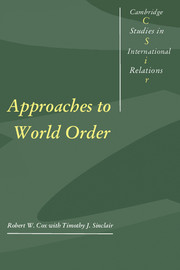Book contents
- Frontmatter
- Contents
- Preface
- Acknowledgements
- Part I Overviews
- Part II Theory
- Part III Interpretations
- 10 The global political economy and social choice (1991)
- 11 “Real socialism” in historical perspective (1991)
- 12 Structural issues of global governance: implications for Europe (1991)
- 13 Middlepowermanship, Japan, and future world order (1989)
- 14 Production and security (1993)
- 15 Global perestroika (1992)
- Part IV Multilateralism
- Complete bibliography of works by Robert W. Cox to 1995
- Index of names
- Index of subjects
- CAMBRIDGE STUDIES IN INTERNATIONAL RELATIONS
11 - “Real socialism” in historical perspective (1991)
Published online by Cambridge University Press: 05 June 2012
- Frontmatter
- Contents
- Preface
- Acknowledgements
- Part I Overviews
- Part II Theory
- Part III Interpretations
- 10 The global political economy and social choice (1991)
- 11 “Real socialism” in historical perspective (1991)
- 12 Structural issues of global governance: implications for Europe (1991)
- 13 Middlepowermanship, Japan, and future world order (1989)
- 14 Production and security (1993)
- 15 Global perestroika (1992)
- Part IV Multilateralism
- Complete bibliography of works by Robert W. Cox to 1995
- Index of names
- Index of subjects
- CAMBRIDGE STUDIES IN INTERNATIONAL RELATIONS
Summary
It is not the business of the historian to award prizes for virtue, to propose the erection of statues, or to establish any catechism whatever; his business is to understand what is least individual in the course of events …
Georges Sorel, Reflections on Violence (1906)The death of socialism is affirmed everywhere today as a matter of common knowledge, from yesterday's newspaper to the neo-Hegelian “end of history” proclaimed by Francis Fukuyama, and the neo-Burkian reflections on revolution in eastern Europe by Ralf Dahrendorf. The events of eastern Europe are read as the definitive seal of closure upon something much broader than the regimes of “real socialism.” They signal the end of an historical project that had its origins in the response of nineteenth-century industrial society to the disintegrating impact of capitalism. Or so it would seem.
Those who retain socialist convictions must treat the proclamation seriously, even in offering Mark Twain's rejoinder that it is greatly exaggerated. Two lines of argument are weak responses. One is that Soviet (or by extension, Chinese, or Cuban or …) socialism was never true socialism. It was from the beginning, or from some later stage, a deformation, a perversion, of the true thing. Like Christianity, socialism has never been tried. The other weak rejoinder is that the failure of socialism was the fault of evil men – Stalin in the first place and secondarily of a corrupted nomenklatura.
- Type
- Chapter
- Information
- Approaches to World Order , pp. 209 - 236Publisher: Cambridge University PressPrint publication year: 1996
- 1
- Cited by

